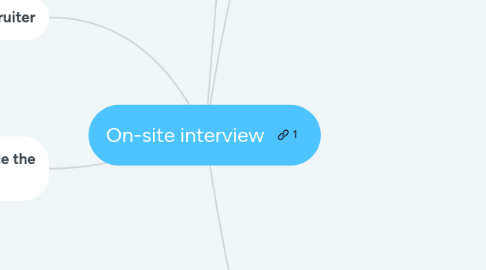
1. What to wear: ask your recruiter
2. Throughout the interview, reinforce the idea that you can do the job well
2.1. NOT being the smartest candidate
2.2. NOT being the candidate with the most years of experience
2.3. NOT the candidate who has used the most types of technology
2.4. Reasonable to work with
2.5. Has enough skills to do the work
2.6. Can get things done
3. Usually has a tour
3.1. Are the work spaces calm and easy to work in?
3.2. Do the people look reasonably happy and friendly?
3.3. Are the laptops eight years old?
4. One or more technical interviews
4.1. Point is to see whether you have the minimally necessary skills to do the job
4.2. If you've created the portfolio, you've already passed the interview
4.3. Show the interviewer you have skills needed for the job
4.3.1. NOT answering every question perfectly
4.4. How to answer questions
4.4.1. Don't just give an answer; also explain why you got the answer
4.4.1.1. Shows how you think about the subject even if you didn't give the right answer
4.4.2. Reference your experiences
4.4.2.1. You're grounding the conversation in your real-world practical skills
4.4.2.2. Can make an ambiguous answer more credible and concrete
4.4.3. Be open and honest if you don't know an answer
4.4.3.1. Also explain what you do know about the answer
4.4.4. Much better to wait to give a strong answer than to give a weak one quickly
4.5. Types of questions
4.5.1. Machine Learning
4.5.1.1. Algorithms: k-means, linear regression, random forest, PCA, SVM
4.5.1.2. Methods of using them: CV, boosting
4.5.1.3. Expertise in using them in practice: e.g. when some tend to fail
4.5.2. Statistics
4.5.2.1. If your work is in area that answers them (experimentation)
4.5.2.1.1. statistical tests (t-tests)
4.5.2.1.2. definitions (ANOVA, p-value)
4.5.2.1.3. probability distributions (expected value)
4.5.3. Combinatorics
4.5.3.1. Mostly as insight into problem-solving skills
4.5.4. Databases and programming
4.5.4.1. SQL
4.5.4.2. R/Python
4.5.5. Business domain expertise
4.6. Questions for you to ask the interviewer
4.6.1. What technologies do you use, and how do you train new hires on them?
4.6.2. Who is our team's stakeholder, and what's the relationship with them like?
4.6.3. How do you do quality control on data science work?
5. One or more behavioral interviews
5.1. Your experiences
5.2. How you dealt with difficult situations
5.3. How you make sure projects come to fruition
5.4. Example questions
5.4.1. Tell me about yourself
5.4.2. What's a project you've worked on, and what did you learn from it?
5.4.3. What is your greatest weakness?
5.5. Answer framework
5.5.1. Explain the question in your own words
5.5.2. Explain an experience in which that situation occurred, focusing on why the problem existed
5.5.3. Describe the action you took
5.5.4. Give a summary of what you learned
5.6. Plan your answers in advance!
5.6.1. 3 or 4 stories for:
5.6.1.1. working in a challenging situation
5.6.1.2. handling difficult teammates
5.6.1.3. managing failure
5.6.2. Describe a past project: pick:
5.6.2.1. Challenging situation
5.6.2.2. You overcame adversity
5.6.2.3. Difficult teammates
5.6.2.4. Found a solution
